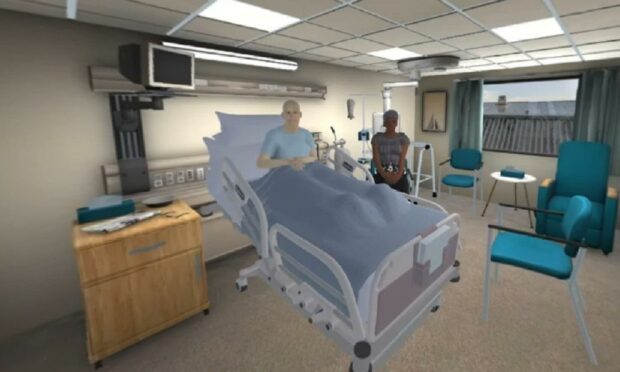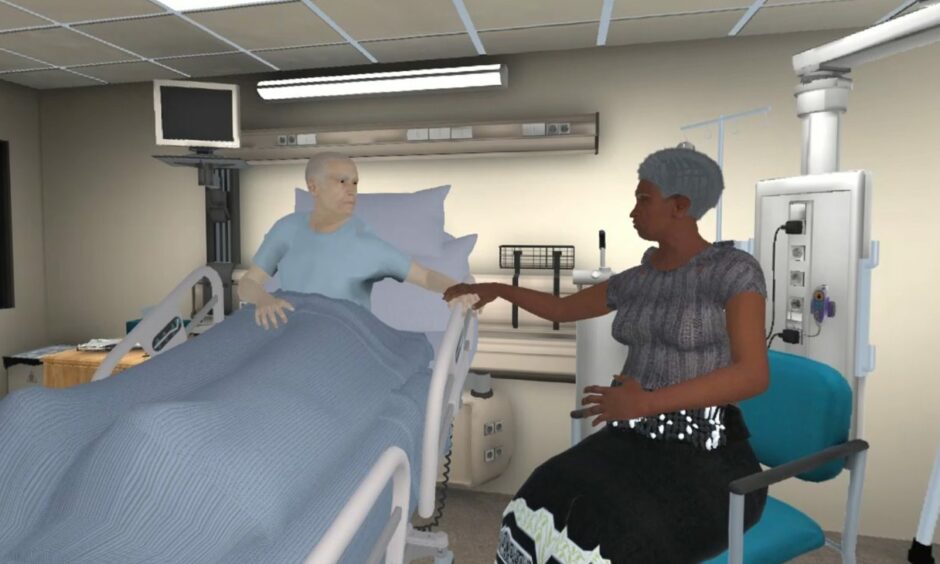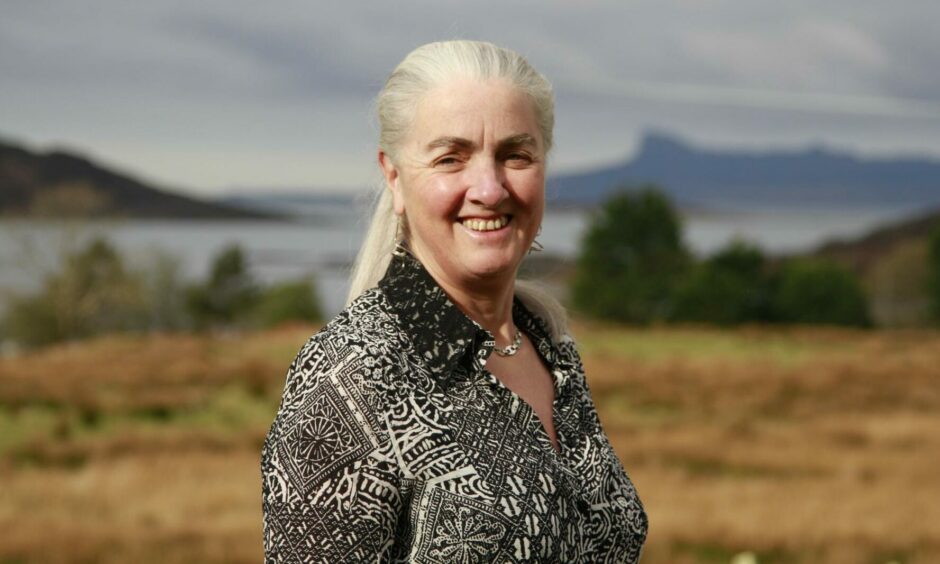End of life conversations are a difficult but inevitable part of healthcare professionals’ lives.
But how can they train realistically for these sensitive events without directly speaking to patients and their families?
The answer may be to have the ‘face-to-face’ talk initially in the virtual world.
Students in the Highlands and Islands are trialling virtual reality (VR) technology allowing them to build confidence and skills in a highly emotional situation.
Who is behind the project?
The pilot scheme is receiving positive feedback from students and lecturers who feel it could have widespread applications.
It is part of a wider project developed by a Highland company which wants to transform online learning.
It is experimenting with immersive VR and gaming technology to train college, university and school students.
Arisaig-based The VR Hive is working with eight undergraduate nursing students and four lecturers from the University of the Highlands and Islands (UHI) department of nursing and midwifery.
Using VR headsets or smartphone technology, students enter a simulated interactive scenario in a hospital ward with ‘Richard’, a patient with severe, end-stage respiratory disease.
While meeting Richard and his wife Mary, the student is asked by Richard ‘Am I going to get better?’
The student interacts with the avatars in real time and responds to Richard and Mary by choosing a variety of different options.
The outcome differs depending on responses and is shaped by the different options the student chooses.
The impacts of different practices are seen and Richard’s thoughts about how the student is communicating are heard.
Lifelike dialogue and noises
The virtual environment is made more lifelike by using dialogue from real actors, background noise and constant bleeping of monitors.
Dr Clare Carolan, a senior lecturer in the department of nursing and midwifery’s UHI Western Isles campus, says the project is an innovative way to support student nurse education.
She said: “Regardless of where our nursing students’ career paths eventually take them, one certainty is that they will care and support patients who are dying and their families at some point.
“Therefore, building our students’ confidence and competence to have difficult conversations is vital.
“Supporting difficult conversations around death and dying is critical to provide high quality end of life care for patients and for their loved ones.”
Building our students’ confidence and competence to have difficult conversations is vital.”
Dr Clare Carolan
She stresses the technology will not replace current teaching strategies in end-of-life care, but will enrich and add to it.
“Students get teaching and learning on communication skills, palliative and end of life care throughout their course. This can include simulated role-play.
“However, we were conscious that from very early on during their practice learning placements students will need be able to talk with patients about death and dying and what matters to them.”
The technology is being used by individuals or simultaneously by a group of students who can discuss their shared learning.
Safe learning space
Dr Carolan added: “It is a psychologically safe learning space for students so they can develop their confidence in developing these skills at their own pace.
“Having a human voice for the avatars and hearing Richards’s inner thoughts made the whole learning experience emotionally engaging and memorable for students.”
The project has been developed as a ‘proof of concept’ and the next step is to test and evaluate it in a larger group of students.
Dr Carolan said: “I certainly think this technology could be rolled out to a wide range of health and social care professionals.
“For example, healthcare assistants working in care home settings play a key role in supporting patients and families at end-of-life.
“Another wider application of such technology might be developing learning resources for the general public to promote and support conversations about death and dying.”
Helping to prepare students
Sam Thomas, a third-year student based at the centre of health science in Inverness, says the training can help prepare students before they face end-of-life conversations in clinical practice.
He said: “I think this idea of simulating practice through VR allows students to become aware of the variety of approaches that can be taken for these difficult conversations around palliative care.
“It means they can try different approaches and see which works better.”
He says the VR training can provide more realistic feedback than exercises with colleagues pretending to be patients.
Sam added: “It’s a really innovative and novel approach to learning.
“I believe VR has a huge role to play in the future of healthcare education”.
Anne Widdop, CEO and founder of The VR Hive, said: “My vision is to transform online learning using cutting edge technology like AI and immersive technology to enable students to really experience situations, and interact with the content, that way they will learn so much more.”
“It is a really exciting time to be working on the evolution of education and I can’t thank the staff and students at UHI for their input.”
You might also like:


